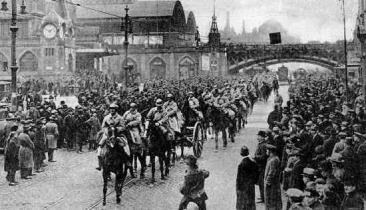Analysis of the Inter-War Period
France occupies the Ruhr (1923)

The French occupation of the Ruhr was announced on January 11, 1923 in an attempt by France to forcibly obtain the large amounts of coal that was present in the Ruhr. It was started by the French Prime Minister Raymond Poincare in an attempt to exploit Germany of its resources. As the industrial heartland of Germany, the Ruhr contained a plentiful amount of coal which the French scarcely had. But the French contained a large supply of iron ore which the Germans wanted. These two resources alone were not worth as much money then if they were sold together. This gave the French an incentive to occupy the Ruhr state of Germany and weaken Germany’s economy. France’s reason for invading the Ruhr included the fact that Germany was unable to pay the reparations for World War One. These reparations were issued to the Germans by the French when World War One ended with the allies victorious and therefore blaming all causes of the war on Germany. When the French realized that the Germans wouldn’t be able to pay the reparations, this gave them reason to invade and weaken Germany’s industrial heartland. As soon as the French started invading the Ruhr, many factories and citizens of Germany began riots, coups, resistance and passive resistance. Any opposition leaders and people who opposed the French occupations were shot and or arrested by French and Belgium soldiers so that French workers could work in the mines. Some of the opposition that French and Belgium troops were faced with include Fritz Thyssen and the industrialists who had placed investments on the Ruhr and wouldn’t be easily giving up that investment without a conflict. When the German Chancellor, Gustav Stresemann, paid the reparations for WWI, the French withdrew and stopped their invasion of the Ruhr. The German Red Cross, ICRC, sent their people into the Ruhr to investigate the situation in the Ruhr and the amount of people that have been removed.
The Major Concepts contributed to France occupying the Ruhr in 1923 include Confrontation of the German citizens against French and Belgium soldiers, cooperation being highly lacking because German workers of the Ruhr were furious about the French occupying the Ruhr, nationalism rose because Germans wanted to defend their own territory, national security of the German Ruhr area was being threatened by France, regional security of the Ruhr being threatened by France, the Alliance between France and Britain was slowly decaying due to this incident and Britain's decision to not be involved because occupying the Ruhr was beyond the demands of the Treaty of Versailles, economic security of Germany was being threatened by France, expansionism was a minor goal for France, conflicts between Germany and French as well as France against Britain.
The Occupation of the Ruhr may have contributed to the escalation of tension leading to WWII because by occupying the Ruhr, France has damaged its relationship with Germany and so Germany would probably want to take revenge on France for forcing them (Germany) to pay reparations for WWI. Due to the occupation of the Ruhr area valley, Germany went into hyperinflation with the rise of prices starting from Sept. 1923 at 26% a day. Germany’s economy also went into inflation because they needed to print more money in order to pay all of their owing reparations and so little by little their money started to lose its value. This gives Germany another reason to go into war against France.
The Major Concepts contributed to France occupying the Ruhr in 1923 include Confrontation of the German citizens against French and Belgium soldiers, cooperation being highly lacking because German workers of the Ruhr were furious about the French occupying the Ruhr, nationalism rose because Germans wanted to defend their own territory, national security of the German Ruhr area was being threatened by France, regional security of the Ruhr being threatened by France, the Alliance between France and Britain was slowly decaying due to this incident and Britain's decision to not be involved because occupying the Ruhr was beyond the demands of the Treaty of Versailles, economic security of Germany was being threatened by France, expansionism was a minor goal for France, conflicts between Germany and French as well as France against Britain.
The Occupation of the Ruhr may have contributed to the escalation of tension leading to WWII because by occupying the Ruhr, France has damaged its relationship with Germany and so Germany would probably want to take revenge on France for forcing them (Germany) to pay reparations for WWI. Due to the occupation of the Ruhr area valley, Germany went into hyperinflation with the rise of prices starting from Sept. 1923 at 26% a day. Germany’s economy also went into inflation because they needed to print more money in order to pay all of their owing reparations and so little by little their money started to lose its value. This gives Germany another reason to go into war against France.
